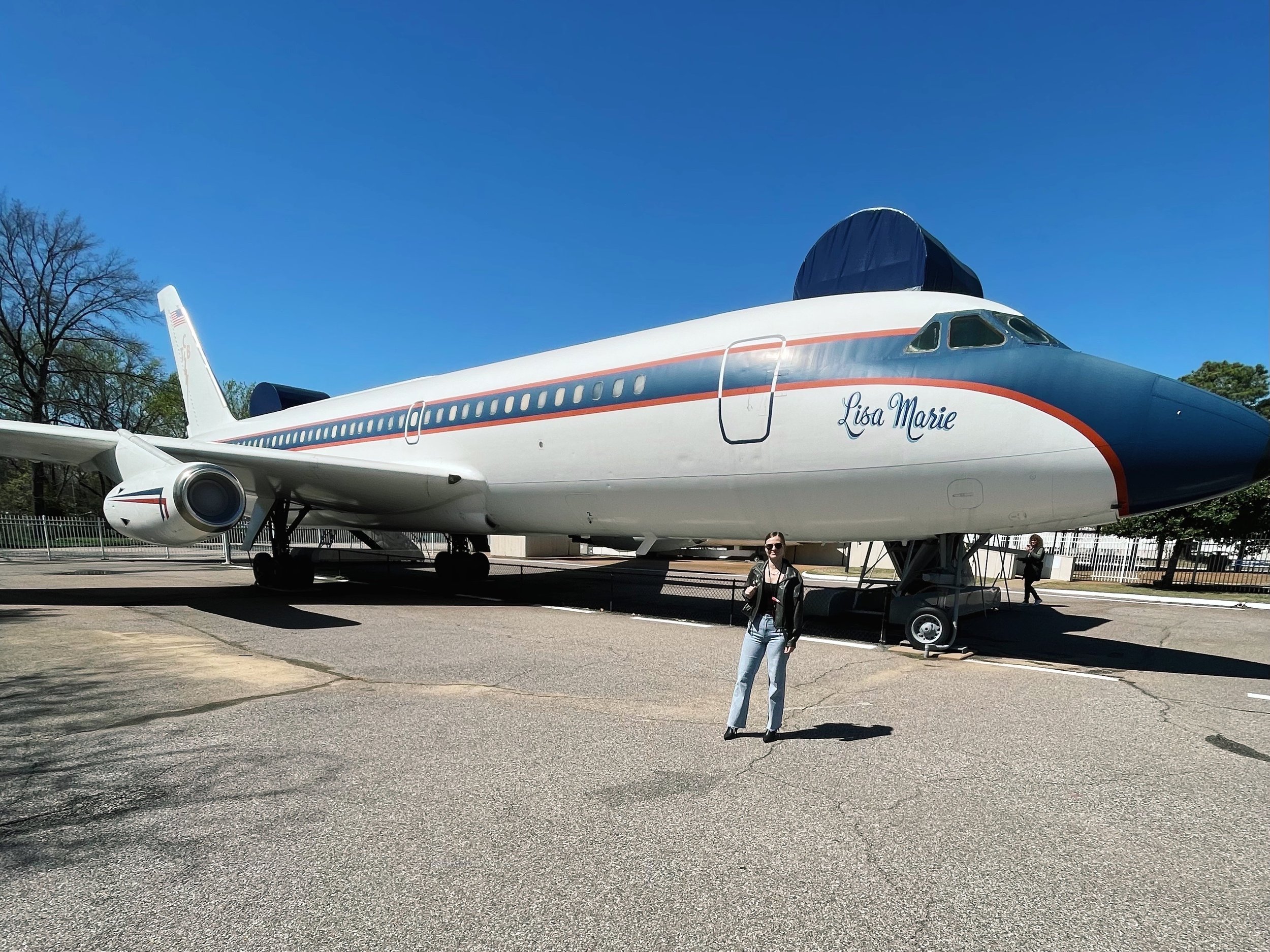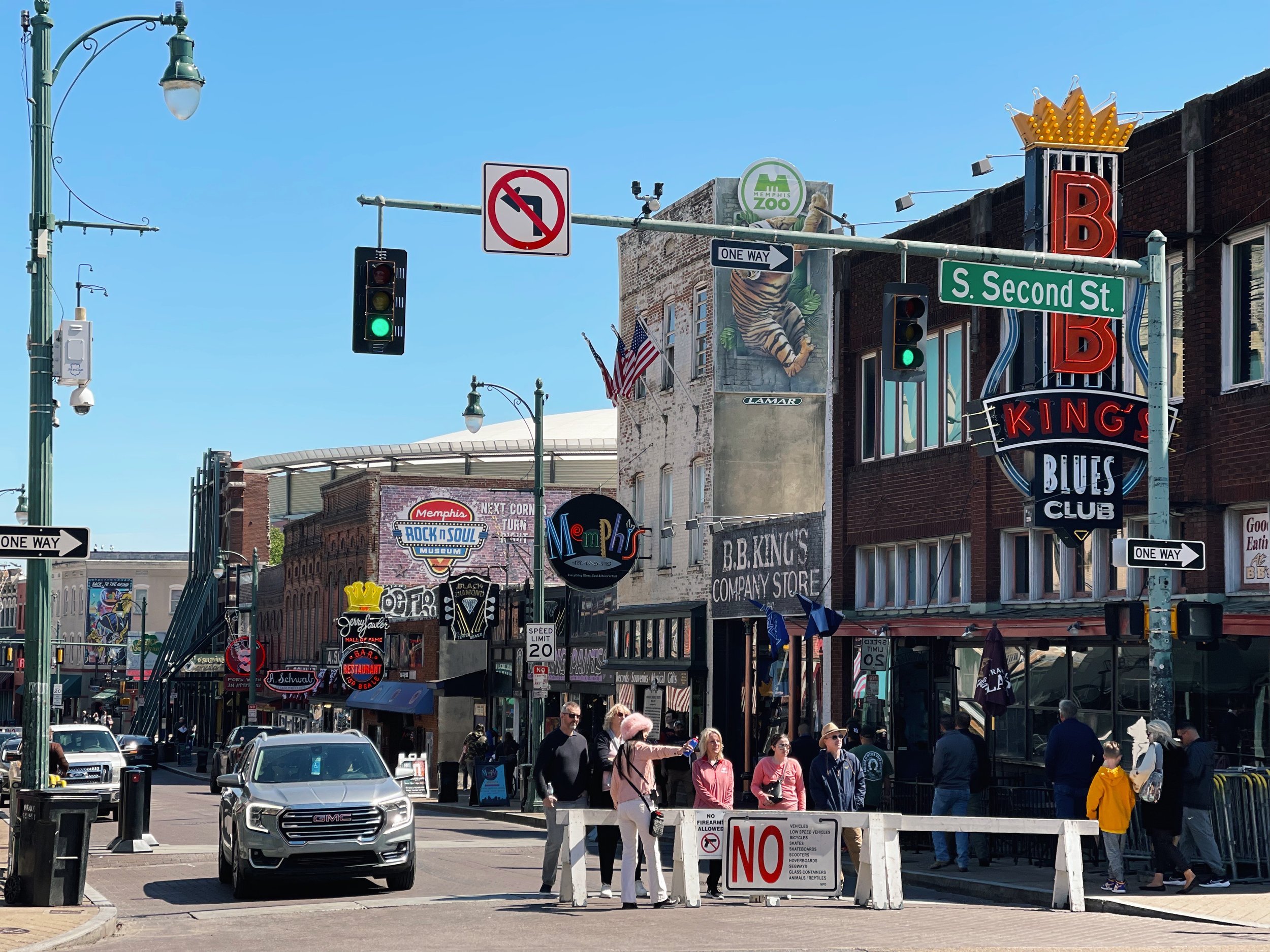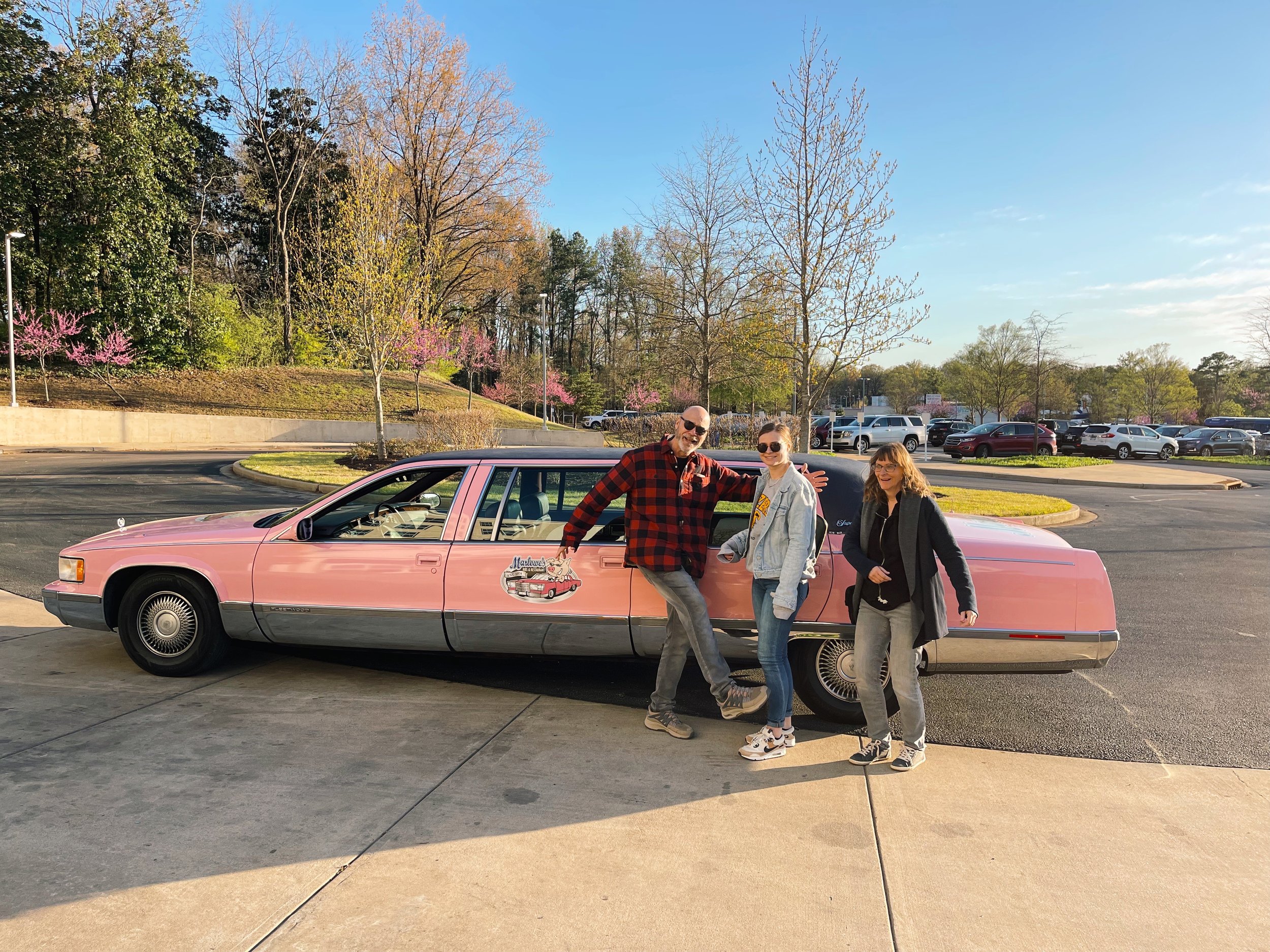Between Grief and Graceland: Part Two
Graceland
The next day—my 30th birthday—was dedicated to touring Graceland, a plan I had made intentionally. If I was going to visit Elvis’s home, it had to be on my actual birthday. A friend once joked that for me, visiting Graceland was like a pilgrimage to Mecca. My Elvis obsession began the way all my musical fixations do: I watched the Elvis movie, spiraled into deep research on his life and music, and ultimately decided he was my all-time favorite artist. I admired his journey—from a humble, two-room house in Tupelo, Mississippi, to living like a king in his Memphis mansion. He was a dreamer. Massively talented. Culturally groundbreaking. Deeply spiritual. Eccentric. Wild.
On the tour bus from our hotel to Graceland, the guide sang “Happy Birthday” to me— she had asked if there were any special celebrations that day, and before I knew it, the entire bus was in on it. I smiled politely through the song, only mildly embarrassed.
My parents and I had opted for the Ultimate VIP experience, wanting to make the most of the day. We spent hours exploring the mansion, walking the grounds, and marveling at the over-the-top decor—my favorite being the Jungle Room, featuring green shag carpet on both the floor and ceiling, heavy Polynesian-inspired wood furniture, and an indoor waterfall. The outdoor memorial area, where Elvis is buried alongside his family, felt especially moving.
“But beneath it all, there was a gnawing in the pit of my stomach—an inescapable reminder of the loss that followed us everywhere, including here.”
We browsed through countless artifacts, admired the costumes from his legendary Las Vegas shows, and took in his impressive collection of beloved Cadillacs. Our guide, brimming with knowledge, shared story after story, each one adding another layer to the myth and man that was Elvis Presley. One of the attractions I had been looking forward to the most was touring his private jet, the famous “Lisa Marie,” affectionately named after his daughter.
I should have felt more excited.
But beneath it all, there was a gnawing in the pit of my stomach—an inescapable reminder of the loss that followed us everywhere, including here. And no matter how brightly the sun shone in the clear blue Memphis sky, I couldn’t shake the chill that clung to me, deep and unrelenting.
Elvis’s private jet, the ‘Lisa Marie.”
Our last full day was packed with a city tour and a visit to the legendary Beale Street. The tour took us to Lansky’s, the upscale clothing store where Elvis shopped, and Sun Studio, the iconic recording studio where he—and countless other legends—got their start. We stopped at the luxurious Peabody Hotel just in time for the beloved duck march, then drove past the Lorraine Motel, where Martin Luther King Jr. was assassinated—a sobering moment that contrasted the city’s vibrant energy. As we took in the skyline, our guide pointed out historic landmarks, weaving stories of Memphis’ past and present. Finally, we arrived at Beale Street—alive with the raw, soulful sounds of blues music and an electric atmosphere. We walked all along the bustling street down and back, popping in and out of souvenir shops along the way.
Beale Street
That night, after returning to the hotel, we found a local band playing in the lobby, serenading guests with cover after cover of slow southern rock. I was exhausted, but my dad wanted to stay, to enjoy the music on our last night. My mother headed up to bed, and I ordered an Old Fashioned at the bar. We sat as close to the music as we could, talking in quiet intervals between songs. Our conversation drifted around Anfernee, our family, and life. More than anything, I let my dad talk. I felt he needed to.
Weariness settled around his eyes, where laugh lines had long been etched. I had always admired his natural joyfulness, the unwavering positivity that had given our family strength in uncertain times. But beneath the warm glow of the hotel’s glamorous chandeliers, his usually bright blue eyes dimmed with a quiet sadness.
Anfernee was our family’s second great loss; the first had been my other brother, Jesse, seven years earlier. Both were horrific, both untimely. Both had left our family shattered, padding around in the wreckage, trying to pick up the pieces of our lives. Between sips of bourbon and the band’s rendition of Southern Nights, we rehashed these tragedies as if we could somehow solve the pain—the deep, unanswerable ache of why?
I continued to let this question haunt me as I finally made my way to bed for the night.
On our flight home, the plane was nearly empty, and I was fortunate enough to have the whole row to myself. It gave me the time and space to let my mind wander—processing the trip, the funeral, and the traumas that had plagued our family.Then, out of nowhere, a dark, self-indulgent thought crept in: Was I put on this earth just to suffer? To take the punches life threw at me and try my best to survive them, one after another?
“If I dug deep enough, I could still find the spark that was always there—the tiny glimmer that kept me going, no matter what. The hopeful glow of survival. And after a while, that spark would ignite into something much brighter.”
I looked out my window searching for some sign, or answer, when I caught a glimpse of the setting sun through layers of clouds. It looked exceptionally vibrant, but only slivers of it reached my eyes. I craned my neck, desperate for a clearer view, but the plane kept moving, and the clouds never parted enough to give me the whole picture. Soon, we were enveloped by the night, and my heart sank with the sun. It felt like the universe itself was rubbing salt into an undressed wound. I just wanted some light. Some warmth. Some hope.
Suddenly, I sensed movement in the aisle next to me and turned to see my mother shuffling into the empty seat in my row. “What’s up?” I asked, my voice a little sharper than I intended. “Nothing,” she replied, settling in beside me. “I just thought you might not want to be alone.”
I definitely wanted to be alone. Bitter and miserable, I was reeling from a year of highs and mostly lows, searching for a place to land. After leaving the security of my full-time job to pursue self-employment, I had been trying to get my business off the ground, while dealing with the aftermath of an agonizing breakup, and treading water in an endless ocean of uncertainty. I had dismantled everything—broken it apart with the full hope of creating something meaningful, something lasting. To build a life I could be proud of, knowing I had taken the more difficult road to get there. But now, I felt more unstable than I had at 20, in a world colored with a new shade of grief.
What was it all even for?
As the plane hummed steadily through the evening, my mother and I sat together in silence, side by side. I wasn’t alone. I had family, friends, and treasured memories of those I love, and have lost, to hold onto. In time, I knew I would find my way through the smog of deep sadness and uncertainty, just as I had before. Eventually, I would regain the warmth that had been stolen from my body. If I dug deep enough, I could still find the spark that was always there—the tiny glimmer that kept me going, no matter what. The hopeful glow of survival. And after a while, that spark would ignite into something much brighter.
Giving our best “rock n roll” for Marlowe’s Barbeque



